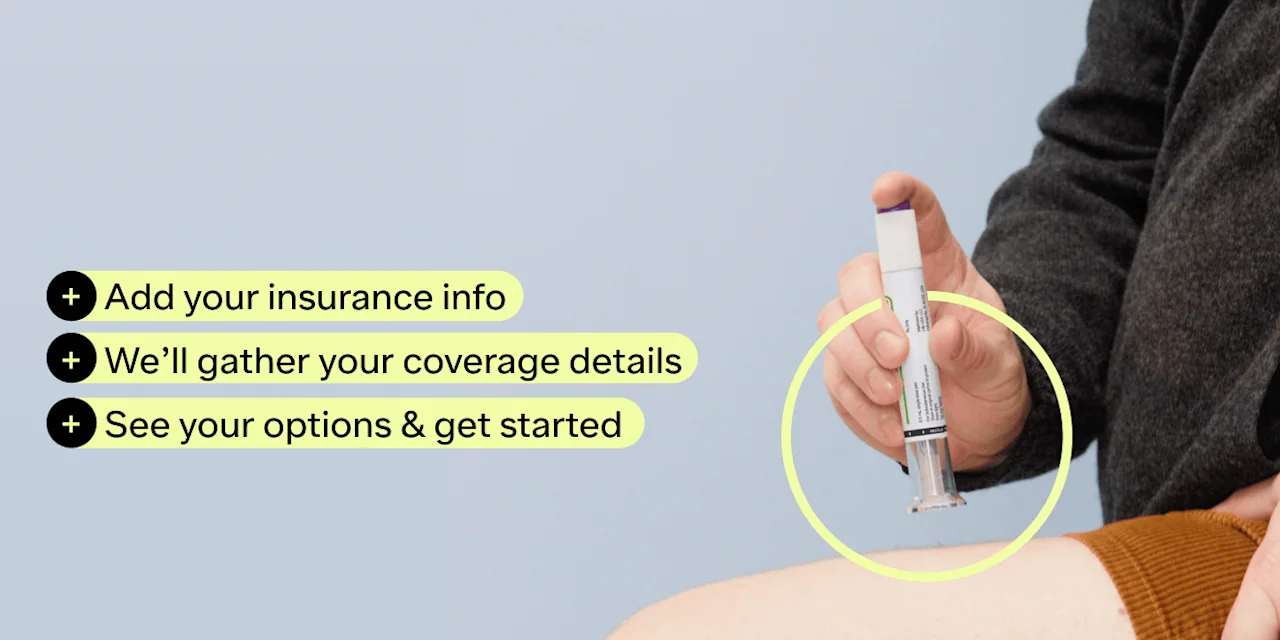Here's what we'll cover
If you’re being treated for type 2 diabetes but your current treatment plan isn’t lowering your blood sugar levels or supporting your weight loss goals, your healthcare provider might suggest drugs like Ozempic or Victoza.
Ozempic and Victoza are injectable type 2 diabetes medications with one key difference: how often you use them. Continue reading to learn which medication may be right for you.
Ozempic Important Safety Information: Read more about serious warnings and safety info.
What are Ozempic and Victoza?
Ozempic and Victoza are injectable medications used to treat type 2 diabetes mellitus. They belong to a drug class known as glucagon-like peptide-1 receptor agonists (GLP-1 RAs). Healthcare providers typically prescribe these medications when other drugs—such as metformin—aren’t effective enough at controlling a person’s blood sugar.
Other examples of GLP-1 receptor agonists include Trulicity and Rybelsus. These drugs work by improving the effects of insulin in the body and increasing feelings of fullness after eating, which can sometimes help with weight loss.
The key difference between Ozempic and Victoza is how often you use them. Those who use Ozempic inject it once per week, and those who use Victoza inject it daily.
Ozempic
Ozempic (see Important Safety Information) is a brand-name drug that contains the active ingredient semaglutide.
After your provider shows you how to use Ozempic, you administer it yourself as an injection, or with the help of someone else, once a week through subcutaneous injection (under the skin) in your stomach or thigh. You can take your weekly semaglutide with or without food.
Victoza
Victoza is the brand name of the generic drug liraglutide. It’s an injectable liquid that healthcare providers use to improve blood sugar levels in people with type 2 diabetes.
You administer it daily subcutaneously in your stomach or thigh, and you can take it with or without food.
Ozempic and Victoza dosage
The starting dose of Ozempic is usually .25 mg once weekly. After four weeks, your healthcare provider may increase the dose to .5 mg weekly, then to 1 mg weekly. If, after an additional four weeks, you require more blood sugar control, they may increase your prescription to the maximum dose of 2 mg weekly.
For Victoza, the starting dose is typically .6 mg daily for one week. Similarly, if you need more blood sugar control, your healthcare provider may increase your dose to 1.2 mg daily. If your body does not respond to this dose increase after one week, your healthcare provider may increase the dose again to 1.8 mg daily.
Conditions treated with Ozempic and Victoza
The FDA approves medications like Ozempic and Victoza for specific uses which are described in detail on each drug’s official labeling and summarized in the sections below.
Healthcare providers may also decide to prescribe glucagon-like peptide-1 receptor agonists like Ozempic off-label (“non-official”) for uses like weight loss.
Ozempic uses
The FDA first approved Ozempic for adults with type 2 diabetes to improve their high blood sugar levels and reduce the risk of cardiovascular events—such as heart attack or stroke. Healthcare providers may also choose to prescribe Ozempic off-label to help people achieve and maintain their weight loss goals, even if they don’t have diabetes or heart disease. Only one brand of semaglutide, an injectable drug called Wegovy (see Important Safety Information), is FDA-approved for weight loss.
Clinical trials have shown semaglutide can help with weight loss in people with type 2 diabetes, and many people with type 2 diabetes achieve healthier blood sugar levels after losing weight.
Victoza uses
Like Ozempic, Victoza is used for the treatment of type 2 diabetes and reduces cardiovascular events like strokes and heart attacks in those with type 2 diabetes.
Some people have also experienced weight loss while on Victoza. The active ingredient in Victoza, liraglutide, is also available under the brand name Saxenda, which is FDA-approved for weight loss if combined with a reduced-calorie diet in people with obesity.
Is Ozempic or Victoza better for weight loss?
One study of 577 adults with type 2 diabetes compared the use of Ozempic and Victoza for weight loss. The study found that Ozempic was more effective than Victoza for lowering HbA1C (glucose levels) and weight–mean body weight decreased by 12.8 lbs with Ozempic and 4.2 lbs with Victoza.
While Ozempic was better for weight management, participants who took Ozempic had more stomach-related side effects than participants who took Victoza.
Side effects of Victoza and Ozempic
The most common side effects of Ozempic and Victoza are stomach-related and include:
Vomiting
Diarrhea
Abdominal pain
Decreased appetite
Dyspepsia (indigestion)
Constipation
While rare, more serious side effects of Ozempic and Victoza may include:
Allergic reactions: Some people may be allergic to Ozempic and Victoza. Medication allergy symptoms include rashes or hives, facial flushing, chest tightness, and difficulty breathing.
Inflammation of your pancreas (pancreatitis): Signs of pancreatitis include vomiting, abdominal pain, and back pain. Pancreatitis can be very dangerous if you do not treat it quickly.
Thyroid cancer: Ozempic and Victoza both carry black box warnings from the FDA about an increased risk of developing medullary thyroid carcinoma. However, this rare side effect has only been seen in animal studies. Researchers aren’t clear if the same risk applies to people.
Vision problems: Lowering your blood sugar too quickly may cause blurred vision and sometimes worsen a condition called diabetic retinopathy.
Ozempic and Victoza warnings
Before prescribing Ozempic or Victoza, your healthcare provider will review your current medical and health history. This medication may not be safe for everyone, so they’ll especially need to know if you have any of the following conditions or factors:
History of pancreatitis
History of medullary thyroid carcinoma (MTC)
Personal or family history of Multiple Endocrine Neoplasia syndrome type 2 (MEN 2)
An allergy to other GLP-1 receptor agonists (examples: Byetta, Bydureon, Saxenda, Trulicity)
If you are pregnant or breastfeeding, there is not enough research to determine whether either of these medications are safe to take. Let your provider know if you are breastfeeding, currently pregnant, or planning to become pregnant. They can work with you to decide if the benefits of Ozempic or Victoza outweigh their potential risks.Novo Nordisk, the manufacturer of Ozempic, recommends that if a person is taking Ozempic, they should stop the drug at least two months prior to pregnancy to permit a “washout” period so that it can leave their systems.
Victoza and Ozempic drug interactions
Ozempic and Victoza can also interact with other type 2 diabetes medications. You should generally talk to your healthcare provider if you also take insulin because there is a chance of hypoglycemia (very low blood sugar) which can potentially be dangerous.
Additionally, be sure to follow your healthcare provider’s medical advice regarding any oral medications you take. Because Ozempic and Victoza slow gastric emptying (causing you to feel fuller for longer), they may affect how your body absorbs oral medications.
Cost of Ozempic and Victoza
As with any medication, the cost of Ozempic and Victoza heavily depends on your personal circumstances, including your medical insurance coverage, your location, and the pharmacy where you fill prescriptions.
Currently, there are no generic versions of Ozempic or Victoza available. This means that if you’re paying out of pocket, your medication may cost a pretty penny. For uninsured patients, you can expect to pay around $1,000 per month out of pocket for Ozempic. For Victoza, the cost without insurance is around $1000 to $1200 per month. Prices can vary depending on which pharmacy you use, so it’s a good idea to shop around a bit to find the best price.
You may be able to lower the cost of Ozempic through savings programs and health insurance. Novo Nordisk, the manufacturer of Ozempic and Victoza, offers an Ozempic savings card for up to a 90-day supply of Ozempic. To qualify, you must have private or commercial insurance and a one-, two-, or three-month prescription for Ozempic.
Differences and similarities between Victoza vs. Ozempic
Key similarities and differences between Victoza and Ozempic include:
Victoza | Ozempic | |
|---|---|---|
Generic form | liraglutide | semaglutide |
If your current treatment plan isn’t working for you, talk to your healthcare provider about Victoza and Ozempic. One of these medications may provide the boost you need to lower your blood sugar levels and reach your weight loss goals.
DISCLAIMER
If you have any medical questions or concerns, please talk to your healthcare provider. The articles on Health Guide are underpinned by peer-reviewed research and information drawn from medical societies and governmental agencies. However, they are not a substitute for professional medical advice, diagnosis, or treatment.
Capehorn, M. S., Catarig, A. M., Furberg, J. K., et al. (2020). Efficacy and safety of once-weekly semaglutide 1.0mg vs once-daily liraglutide 1.2mg as add-on to 1-3 oral antidiabetic drugs in subjects with type 2 diabetes (SUSTAIN 10). Diabetes & Metabolism, 46 (2), 100–109. Retrieved from https://pubmed.ncbi.nlm.nih.gov/31539622/
Collins, L. & Costello, R. A. (2021). Glucagon-like peptide-1 receptor agonists. StatPearls. Retrieved on Feb. 9, 2022 from https://www.ncbi.nlm.nih.gov/books/NBK551568/
Dungan, K. & DeSantis, A. (2022). Glucagon-like peptide 1 receptor agonists for the treatment of type 2 diabetes mellitus. UpToDate . Retrieved from https://www.uptodate.com/contents/glucagon-like-peptide-1-receptor-agonists-for-the-treatment-of-type-2-diabetes-mellitus
United States Food and Drug Administration (FDA). (2017). Highlights of Prescribing Information: Ozempic. Retrieved on Feb. 22, 2022 from https://www.accessdata.fda.gov/drugsatfda_docs/label/2017/209637lbl.pdf
United States Food and Drug Administration (FDA). (2019). Highlights of Prescribing Information: Victoza. Retrieved on Feb. 22, 2022 from https://www.accessdata.fda.gov/drugsatfda_docs/label/2019/022341s031lbl.pdf
Victoza. (n.d.). Victoza FAQ . Retrieved Mar. 2, 2021 from https://www.victoza.com/faq/About-Victoza.html










